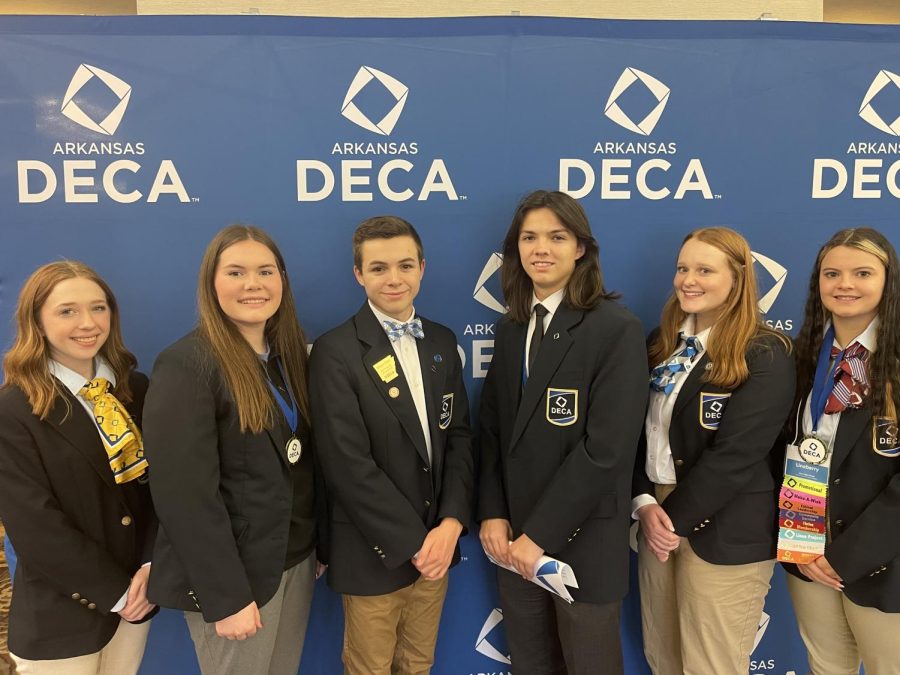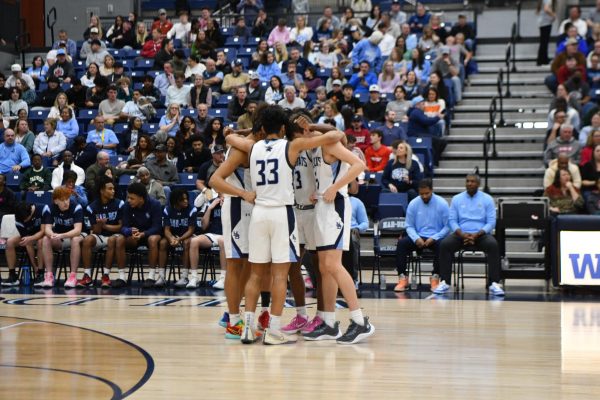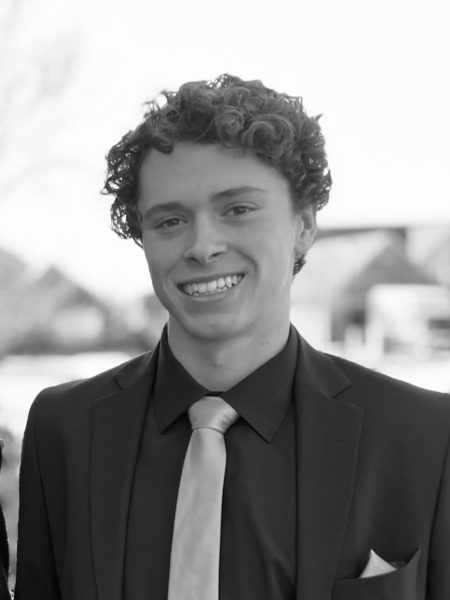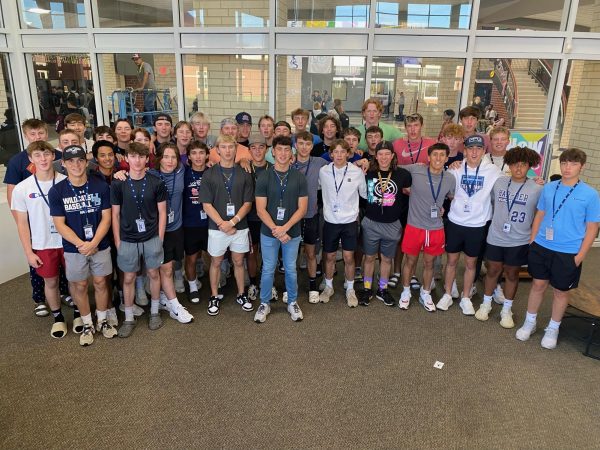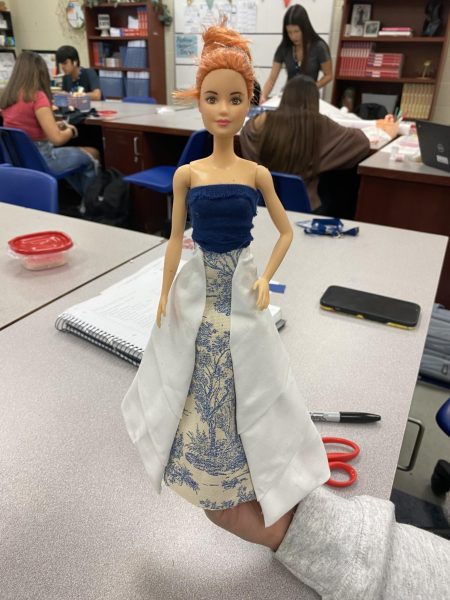Juniors take on state leadership roles for DECA
In February of last year, students and teachers alike roamed the hallways wearing buttons with pictures of juniors Eleanor Wesley and Mason Flynt pinned on their shirts and lanyards. These students were running for state DECA leadership positions, an organization that fosters growth for students in marketing, business, and entrepreneurship with 200,000 high school members globally and 1675 statewide. The pair earned the positions of vice president of hospitality (Wesley) and vice president of leadership (Flynt). This year they’ve decided to try their hand at an officer position again. Flynt is running for president while Wesley is gearing up to take over Flynt’s current job.
“Being vice president of hospitality was really good and fun, but I also feel like switching positions and trying something new could be really good,” Wesley said. “My year of experience can also help me even better at [vice president of leadership].”
In their current positions, both Wesley and Flynt helped plan a leadership conference that took place in downtown Springdale; it gave students in Arkansas DECA a chance to interact hands-on with entrepreneurs in a business-dominated area. They are currently working on planning the state conference, which according to Flynt, is huge and as a result, a lot of work for their team. As vice president of hospitality, Wesley plans events, like a luncheon for judges at a competition.
Although both Flynt and Wesley already have a voice in the inner workings of Arkansas DECA as officers, as president, Flynt could have much more control. His goals are to serve the organization by modernizing it and prioritizing the futures of students. Like Wesley, he believes he can accomplish his goals and be a good leader thanks to his experience, which contrasts with the lack of a single leader with a prior position on the current state officer team.
“I want to create a lot more organization but also plan more for the events in the future instead of what we’ve been doing because we’ve been kind of doing the same thing every year, “ Flynt said. “We want to make it more interactive for the future and grow membership.”
Still, Flynt will miss many aspects of his vice presidency. As president, he won’t be able to vote in the official parliamentary procedure the members take part in at their board meetings. They have these meetings three times a year in Russellville at Arkansas Tech.
“It’s going to be a little difficult for me because right now, my vote means a lot to me,” Flynt said. “It’s just a big deal to be able to say I agree with this, and I disagree with this.”
Like Flynt, Wesley has her own goals for her potential stint as vice president of leadership.
“I want to see more active members and also reach out to our areas and towns that used to be more active but either don’t have a chapter anymore or are just less active,” Wesley said,”I want to see how we can help them and work with them, so they can come to our conferences and events and everything like that.”
The plan for their campaigns this year will be a little different. According to Flynt, the buttons from last year cost the DECA program money, so they have decided to skip out on producing and distributing them. Yet, the process is essentially the same. The duo has to fill out an application that includes recommendations, goals, and qualifications. Then, they have to do a speech at the state career development conference (SCDC) on February 6 and 7 in front of two delegates from each school and advisors who then vote on a candidate for each position. Separately, they make a poster, and all the people who want to be an officer stand in a room at state and are able to share their goals and pass out flyers, which is a way for candidates to meet different people. Once the vote is over, the positions are announced at awards at state.
Although Wesley and Flynt are able to communicate with many of their fellow officers at events, like state, they are also able to interact with them in a variety of other ways. Because officers live all over the state, their main source of communication within the group is social media. The team of six officers have a group chat on Snapchat where they discuss everything from DECA to their daily lives. In addition, they get most of their planning done by meeting on Zoom and also use the platform to call a last-minute vote when needed. On rare scheduled occasions, the state officers have board meetings in Russellville at Arkansas Tech where they discuss official material.
Because frequent communication is key to thriving leadership and as a result of the frequent traveling officers must engage in, Flynt and Wesley have created relationships with their fellow officers on top of strengthening their own friendship. Because the pair were friends before their election, they were able to feel less alone and more comfortable in this new experience.
“It’s been a lot easier to be on an officer team with people you don’t know when you have a friend because then it’s not as awkward, and you already have someone you can talk to and hang out with,” Flynt said. “Also [the other officers and I] have gotten really close because we just added each other on Snapchat and started talking a lot, and we went to Atlanta together.”
Not only have Flynt and Wesley gotten the chance to meet others with similar goals and interests as them in the state, but they also had the opportunity to network with other DECA members outside of Arkansas through Power Trip, which is only open to state and school officers. The October trip in Washington D.C. included a Southern Conference state officer meeting. Wesley, Flynt, and their fellow state officers talked to other officers from other states, learned from what they were doing in their state, and took notes, hoping to improve their own state DECA program. Although months have passed, Wesley and Flynt have remained in contact with some of the officers they’ve met through Instagram, according to Wesley.
Because of the experiences they’ve had through their positions, like those at Power Trip, Wesley and Flynt have learned a lot of skills applicable in other aspects of their life.
“I’ve learned that branching out is not as hard as you think. It may be hard, but it gets easier with time,” Wesley said. “Also being bold and putting yourself out there is a good thing to do.”
As both the president of Har-Ber DECA and vice president of leadership, Flynt has learned a great deal about being a leader this past year that he hopes to take to his potential presidency next year.
“It’s a lot more than the actual title itself,” Flynt said. “It’s a lot of serving others, making sure others are accounted for, that they know what they’re doing, they feel welcomed, that you’re there to guide them, and you’re getting stuff done.”
